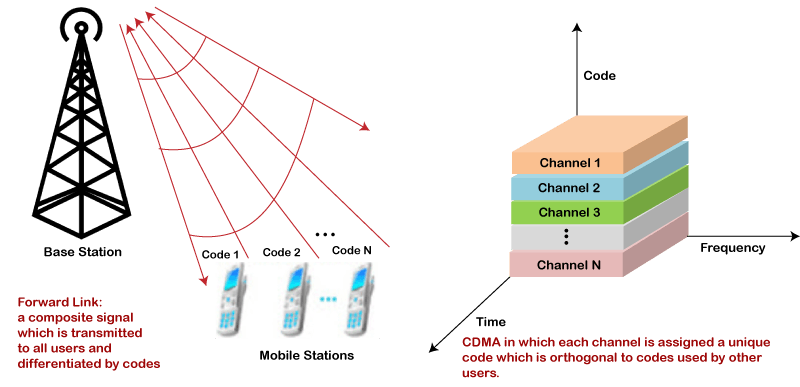CDMA vs. GSM | Difference between CDMA and GSMCellular mobile services have been used all over the world for a long time and still evolving day by day. With these services, various communication services also evolved, and CDMA and GSM are two of them. CDMA and GSM are the two most important technology standards that are known for mobile communication. Both the GSM and CDMA converts the data from the mobile phone into radio waves. But these technologies are differentiated in the way in which the calls & data transfer takes place over a network. One of the key differences between CDMA and GSM is that GSM uses SIM cards to connect a mobile phone with its network, whereas CDMA does not need any SIM card and operates on ESNs (Electronic Serial Number). In this topic, we will understand what GSM and CDMA technologies are and how they differentiate from each other in detail. What is GSM?
Advantages of GSM
What is CDMA?
Advantages of CDMA:
Differences Between GSM and CDMA1. Technology UsedThe GSM is based on the wedge spectrum technology, also known as a carrier. This carrier is split into various time slots on the basis of TDMA technology, and each time slots are assigned to each user. Due to this, until one outgoing call is finished, no other user can access that slot. It uses FDMA to provide multiuser access by dividing the user frequencies. On the other hand, CDMA uses the spread spectrum technology and hence it makes optimal use of the available bandwidth. It enables each user to transfer the data over the entire frequency spectrum at any time. 2. SIM CardsSIM (Subscriber Identity Module) is a smart card that contains the user identification information to identify the subscriber on a telephony device. In a GSM-based phone, a SIM card is required to make the data or call transmission. These cards can be easily replaced from one mobile phone to another with saved information. On the other hand, CDMA based devices do not require a SIM card; instead, it uses ESN (Electronic Serial Number). Since it does not use a SIM card, hence changing a device from another is difficult and required a proper procedure. 3. FlexibilityThe GSM standard is more flexible as compared to CDMA. It is because, in GSM, the SIM card can be inserted into any device and can be used. Whereas, CDMA mobile phone can only be used if ESN is registered in its database. If a CDMA stops working on a phone, we need to buy the new phone, whereas if a SIM stops working, we can use another SIM rather than changing the phone. 4. Spectrum frequenciesThe GSM works on the frequency spectrum ranging from 850 MHz to 1900 MHz, whereas CDMA also operates in the frequency range of 850MHz and 1900MHz. 5. Radiation ExposureIn GSM phones, there is 28 times more radiation exposure takes place as compared to CDMA phones. GSM phone continuously transmits wave pulses, whereas CDMA phones do not continuously produce such pulses. 6. Global ReachGSM is more used globally as compared to CDMA technology. Approx. 80% of the mobile networks across 210 countries use GSM compared to CDMA. The CDMA-based mobile phones are mostly used in the US, Canada, and Japan. 7. SecurityThe CDMA provides more security as compared to GSM technology because it has inbuilt encryption and uses the spread spectrum for data transmission. In CDMA, the signal detection is much difficult than in GSM. Hence it is more secure. 8. Data Transfer RateThe data transfer rate is high in CDMA compared to GSM technology. In CDMA, EVDO data transfer technology is used, which provides a maximum download speed of 2 Mbps. On the other hand, GSM uses EDGE data transfer technology that provides a maximum download speed of 384 Kbps, which is much slower than CDMA. How to check if the phone is based on GSM or CDMA technology?To check if your mobile phone is GSM-based or CDMA based, check the below points: 1. Check from your Phone Settings:
In both cases, if you see the MEID or ESN number, then your phone is CDMA based. If you see the IMEI number, then your phone is a GSM-based phone. If you see both options, it means your device supports both technologies. 2. Check for SIM card Slot on the Phone:As discussed above, the GSM phone makes use of SIM cards, whereas CDMA not. So, you can check on your mobile phone whether it contains a SIM slot or not. But due to widely spread of 4G LTE technology, most CDMA devices also use SIM cards, so this way of checking is less helpful now. Comparison Chart between CDMA and GSM
Conclusion:Both GSM and CDMA have their own importance and depends on how both technologies are being used. Approximately 80% of the world uses GSM, and CDMA is used mostly in the US and somewhere in Canada and Japan.
Next TopicWhat is MAC Address
|
 For Videos Join Our Youtube Channel: Join Now
For Videos Join Our Youtube Channel: Join Now
Feedback
- Send your Feedback to [email protected]
Help Others, Please Share










